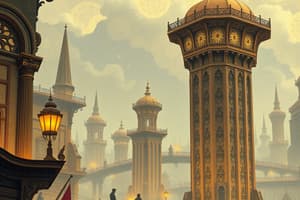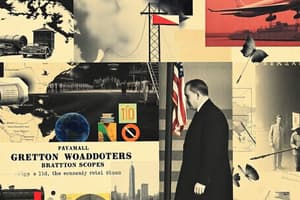Podcast
Questions and Answers
What are the two forms of Traditional Challenges faced by governments?
What are the two forms of Traditional Challenges faced by governments?
- External Intervention and Internal Challenges (correct)
- Economic and Political Challenges
- Internal and Social Challenges
- Security and Identity Challenges
Which of the following best describes Neoliberal Capitalism as mentioned in the content?
Which of the following best describes Neoliberal Capitalism as mentioned in the content?
- Promotion of free trade and dismantling trade barriers (correct)
- Encouragement of strong government interventions
- Focus on protectionism and state control
- Emphasis on economic isolationism
How do Global Social Movements differ from traditional movements?
How do Global Social Movements differ from traditional movements?
- They can transcend national borders and emerge from grassroots organization. (correct)
- They are primarily government-led initiatives.
- They focus solely on economic issues.
- They occur exclusively within one country.
What is one significant effect of globalization on governments?
What is one significant effect of globalization on governments?
What distinguishes Activist Movements from Regressive Movements?
What distinguishes Activist Movements from Regressive Movements?
What role do labor unions seek to fulfill in the late 19th century?
What role do labor unions seek to fulfill in the late 19th century?
What does capitalism emphasize as the main drivers of efficiency?
What does capitalism emphasize as the main drivers of efficiency?
According to Karl Marx, what is socialism considered?
According to Karl Marx, what is socialism considered?
What is a key characteristic of a multinational corporation?
What is a key characteristic of a multinational corporation?
Which of the following is a reason for companies to become multinational corporations?
Which of the following is a reason for companies to become multinational corporations?
What can result from leaving a capitalist economy completely unmanaged?
What can result from leaving a capitalist economy completely unmanaged?
What mainly differentiates socialism from capitalism?
What mainly differentiates socialism from capitalism?
What is the political concept of a state based on?
What is the political concept of a state based on?
What does market integration indicate about separate markets for the same product?
What does market integration indicate about separate markets for the same product?
Which economic sector is responsible for transforming raw materials into manufactured goods?
Which economic sector is responsible for transforming raw materials into manufactured goods?
What was the primary purpose of the Bretton Woods System?
What was the primary purpose of the Bretton Woods System?
Which of the following was NOT one of the key elements of the Bretton Woods System?
Which of the following was NOT one of the key elements of the Bretton Woods System?
Which factor plays a crucial role in maintaining stable prices in an economy?
Which factor plays a crucial role in maintaining stable prices in an economy?
Which currency became the global currency as a result of the Bretton Woods System?
Which currency became the global currency as a result of the Bretton Woods System?
What does the tertiary sector primarily involve?
What does the tertiary sector primarily involve?
How do different economic systems vary across societies?
How do different economic systems vary across societies?
What is the primary purpose of NATO as founded in 1949?
What is the primary purpose of NATO as founded in 1949?
Which organization is known for providing free emergency healthcare in disaster areas?
Which organization is known for providing free emergency healthcare in disaster areas?
What does globalization signify in relation to globalism?
What does globalization signify in relation to globalism?
Who is the current Secretary General of NATO?
Who is the current Secretary General of NATO?
In the context of media theory, what did McLuhan and Flore suggest is more important than content?
In the context of media theory, what did McLuhan and Flore suggest is more important than content?
Which organization focuses on human rights and political prisoners?
Which organization focuses on human rights and political prisoners?
What does informationalism replace according to the content?
What does informationalism replace according to the content?
According to Guy De Bord, what aspect of media is emphasized in media spectacle?
According to Guy De Bord, what aspect of media is emphasized in media spectacle?
What is a defining feature of a nation-state?
What is a defining feature of a nation-state?
What established the notion of the nation-state and sovereignty?
What established the notion of the nation-state and sovereignty?
According to Beland (2008), what is increasing in the role of the state?
According to Beland (2008), what is increasing in the role of the state?
Which of the following is NOT listed as a source of collective insecurity?
Which of the following is NOT listed as a source of collective insecurity?
What is one role of the institutions that govern international relations?
What is one role of the institutions that govern international relations?
What term describes the right of a state to govern itself?
What term describes the right of a state to govern itself?
What was one of Franklin D. Roosevelt's contributions to international relations?
What was one of Franklin D. Roosevelt's contributions to international relations?
What is a key element of sovereignty as it relates to the state?
What is a key element of sovereignty as it relates to the state?
Flashcards are hidden until you start studying
Study Notes
Market Integration
- Refers to the merging of separate markets for similar products into one unified market.
- Indicates the interconnectedness of different markets.
The Economy
- A social institution with a significant impact on society.
- Composed of individuals.
- Organizes the production, consumption, and trade of goods within a society.
- Market integration impacts price stability.
The Economic System
- Varies across different societies.
- More complex than historical systems.
Sectors of the Economic System
- Primary Sector: Extracts raw materials from natural environments (e.g., farmers, fishermen, miners).
- Secondary Sector: Transforms raw materials into manufactured goods.
- Tertiary Sector: Provides services rather than goods.
International Financial Institutions
- Bretton Woods System:
- Established rules for international commercial and financial relations.
- First example of a negotiated monetary order for independent states.
- Aimed to prevent economic turmoil and lack of cooperation between nations.
- Fostered reduced trade barriers and free flow of money globally.
- Key Elements of Bretton Woods System:
- Currency expression based on gold or gold value.
- Central banks agreed to exchange currencies at fixed rates with a 1% margin.
- Establishment of the International Monetary Fund (IMF) to oversee exchange rates.
- Removal of currency restrictions in international trade.
- The US dollar became the global currency.
Capitalism and Socialism
- Capitalism:
- Private ownership of resources and means of production.
- Emphasizes profit maximization and competition.
- Consumers regulate the market by choosing goods with the best value ("invisible hand").
- Requires regulation to prevent market failures like monopolies.
- Socialism:
- Government plays a larger role.
- Collective ownership of means of production (property owned by the state).
- Considered a steppingstone to communism by Karl Marx.
Information Revolution
- Automation and outsourcing led to job displacement.
- Rapid technological developments in the latter half of the 20th century.
Multinational Corporations (MNCs)
- Also known as Global Corporations.
- Operate in their home country and other countries worldwide.
- Benefit from international trade agreements.
- Characteristics:
- High assets and turnover.
- Networked branches.
- Control over operations.
- Continuous growth.
- Advanced technology.
- Skilled workforce.
- Strong marketing and advertising.
- High-quality products.
Reasons for Multinational Corporations
- Access to lower production costs.
- Proximity to international markets.
- Avoidance of tariffs.
Global Interstate System
- State: A political entity with authority over its own affairs.
- Recognized borders by other countries.
- Distinct political community with rules and practices.
- Treaty of Westphalia (1648): Established the concept of the nation-state and sovereignty.
- Elements of a State:
- Permanent population.
- Territory.
- Government.
- Sovereignty (right to self-governance).
Nation and Nation-State
- Nation: A group of people with a shared history and culture, regardless of territorial boundaries.
- Nation-State: A territory-bound sovereign institution that governs individuals sharing a collective history, identity, and culture.
The State's Relevance amidst Globalization
- States maintain some power in shaping globalization.
- The state's role is increasing in advanced societies due to:
- Terrorism.
- Economic globalization.
- Threats to national identity.
- Global disease outbreaks.
Institutions that Govern International Relations
- Peace Treaties and Military Alliances:
- United Nations (UN): Promotes international cooperation and peace.
- North Atlantic Treaty Organization (NATO): A military alliance for collective defense.
- Non-Governmental Organizations (NGOs):
- Operate independently of governments.
- Provide emergency relief and address global issues.
- Examples: Red Cross, Doctors Without Borders, Oxfam, Amnesty International, Save the Children Fund.
- Global Economic Associations:
- World Trade Organization (WTO): Regulates international trade.
- North American Free Trade Agreement (NAFTA): Promotes free trade among Canada, Mexico, and the US.
Globalization and Globalism
- Globalization: The increasing interconnectedness of people and nations across the world.
- Globalism: Network of connections that transcend distances.
- Thin Globalism: Limited interconnectedness.
- Thick Globalism: Extensive interconnectedness.
Informationalism
- The age of information and knowledge exchange, replacing industrialism.
- Characterized by advancements in computers, science, and telecommunication.
Media and Globalism
- Media: The medium through which information is transmitted is essential, according to McLuhan and Flore (2006).
- Media Spectacle: Guy De Bord (1994) highlights the pervasive nature of visually driven media.
Internet and Globalism
- The internet is vital to the contemporary world, as stated by Ritzer (2015).
Global Governance in the 21st Century
- Global Issues:
- Environmental issues.
- Health policies.
- Illicit activities.
- Human rights.
- Refugees, migration, and population movements.
- Weapons proliferation.
Effects of Globalization on Governments
- Traditional Challenges:
- External Intervention: Invasion by other countries.
- Internal Challenges: Political unrest within a country.
- Challenges from National/Identity Movements:
- Tension between cultural identity and state boundaries.
- Global Economics:
- Demands conformity to free-market capitalism.
- Government austerity due to global economic institutions (e.g., WTO).
- Neoliberal Economics:
- Emerged in the 1980s.
- Focuses on free trade and trade deregulation.
- Requires state cooperation with global markets through free capital flow, privatization, and fiscal austerity.
- Perceived as a threat.
- Global Social Movements:
- Spontaneous or grassroots movements across borders.
- Less susceptible to state control.
- Types: Activist movements and regressive or reactionary movements.
Studying That Suits You
Use AI to generate personalized quizzes and flashcards to suit your learning preferences.




